Cultural trends and traditions in our food and lifestyle
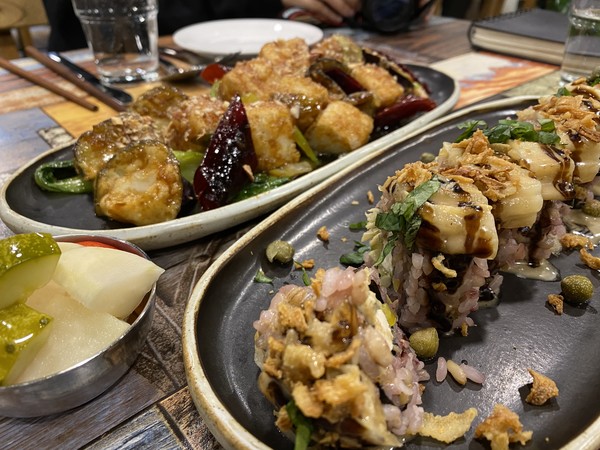
“WE ARE what we eat,”—a famous quote by Ludwig Feuerbach—highlights the importance of healthy eating. For decades, we have been faced with the rise of the fast-food and meat industry. Animal agriculture involves acts of animal cruelty and is also considered one of the main environmental hazards to our society; it emits more greenhouse gases than all the world’s transportation combined[1][2]. Keeping this in mind, it is time to consider a plant-based diet to reduce our carbon footprint and promote healthy lifestyles. There has been a growing number of healthy restaurants reflecting this cultural and environmental shift. These restaurants, unlike fast-food chains, not only provide healthy food that is sustainable for the environment but also highlight the trends and traditions that shape today’s society.
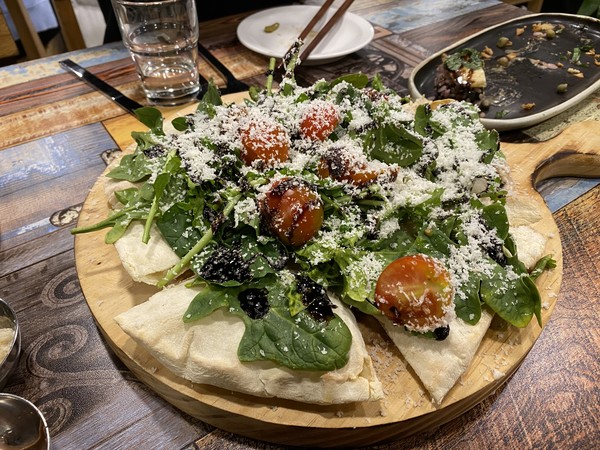
Think Vegan
Think Vegan is a pet-friendly vegan restaurant located near Exit 2 of Line 6 Mangwon Station. As you walk in, you are met with a green interior that resembles a botanical garden, with trees and plants rooted, not in pots, but into the ground. You will also be greeted by the owner’s three dogs as you take your seat. While this atmosphere may seem unusual for some, it is all a part of the owner’s efforts to promote living closely with nature.
Owner Jung Seung-woo opened Think Vegan just this February while preparing for her doctorate at Korea University. Her decision to open the restaurant came when she created Korea’s first plant-based cheese spread with Vicell, a company specializing in healthy Lacto-fermented food. This vegan cheese is also what they serve with their dishes. When asked about her familiarity with veganism in an interview with The Yonsei Annals, Jung explains, “My father was very ill, so he was a vegan for quite some time.” For her, health is the utmost priority; her team creates savory and nutritional dishes using only plant-based ingredients. But Think Vegan thinks beyond the healthy food—it also cares about animals and our environment. The restaurant uses second-hand furniture and certified vegan tissue, towels, hand soap, and hand cream. They also use locally sourced ingredients for their whole menu except for their cheese ingredients, to further limit their carbon footprint. “Although I’m not entirely vegan, I wanted this to be a place where people can experience and think comfortably about veganism,” she elaborates, as she describes the meaning behind Think Vegan. By creating an eco-friendly atmosphere, she familiarizes people with the rather unorthodox yet growing concept of veganism in Korea.
We ordered Crispy Tofu and Eggplant, Muk-eun-ji Kimchi Roll, and Spinach Pizza. All three dishes were visually appealing, delicious, and nutritional. Jung especially recommended the Ripened Kimchi Tofu Roll. “We make our own muk-eun-ji[3] and sesame dressing which requires a lot more time and effort compared to our other dishes. Since kimchi can go sour very soon, we need to pay extra attention to always maintain fresh ingredients.” While vegan food is thought to be bland, they created such an appetizing taste with only plant-based ingredients. Visiting Think Vegan can be an opportunity for you to reconnect with nature by thinking about a healthy and sustainable lifestyle.
Menu: Crispy Tofu and Eggplant \9,000, Muk-eun-ji Tofu Roll \9,000, Spinach Pizza \14,000
Hours: Tuesdays–Sundays, 11:00 a.m.-22:00 p.m., break time: 3:00 p.m.–5:00 p.m.
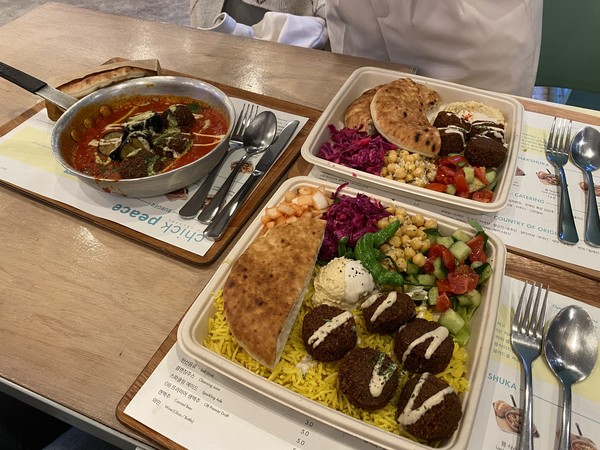
Chickpeace
Chickpeace is a Mediterranean restaurant located near Exit 8 of Line 3 Sinsa station. Their restaurant operates similarly to a fast-food restaurant, with self-service kiosks near the entrance for the customers to order from. Despite this similarity, the dishes Chickpeace serves are far from the lackluster, unhealthy options at fast-food establishments. They serve Mediterranean cuisine, with fresh chickpeas and greens as their main ingredients.
Chickpeace was opened by Chef We Won-jun back in 2018 to reinterpret and recreate Mediterranean cuisine, also referred to as Middle Eastern cuisine, here in Seoul. The restaurant introduces dishes mainly found in areas around the Mediterranean and Middle Eastern countries such as Israel, Lebanon, and Egypt, to name a few. Their menu centers around falafels, hummus, and pita bread—all of which are vegan. While Chickpeace does not limit itself to locally sourced ingredients, it highlights cultural diversity by focusing on Middle Eastern cuisine. With these dishes gradually joining mainstream culture and gaining a presence, consumers can readily explore and appreciate the customs and traditions of Middle Eastern culture, including the preparation of halal food[4][5]. It teaches us that food is more than just fuel—it reflects culture, religion, and tradition.
While Chickpeace offers both vegan and non-vegan options, we decided to try three vegan dishes: Original Hummus, Vegan Shakshuka[6], and Falafel Rice. All three dishes had falafels and were served with pita bread. We grabbed a piece of pita bread, mashed a falafel in it, added chickpeas, tomato, cabbage, and cucumber, and topped it with hummus and Shakshuka’s tomato spread. This pita sandwich was crunchy and full of flavor due to its diverse ingredients. Eating the authentic and wholesome dishes at Chickpeace will not only enhance your diet but will also familiarize you with Mediterranean cuisine and culture.
Menu: Original Hummus (Vegan) \8,000, Vegan Shakshuka \11,000, Falafel Rice (Vegan) \10,000
Hours: Mondays-Sundays 11:30 a.m.-21:00 p.m.
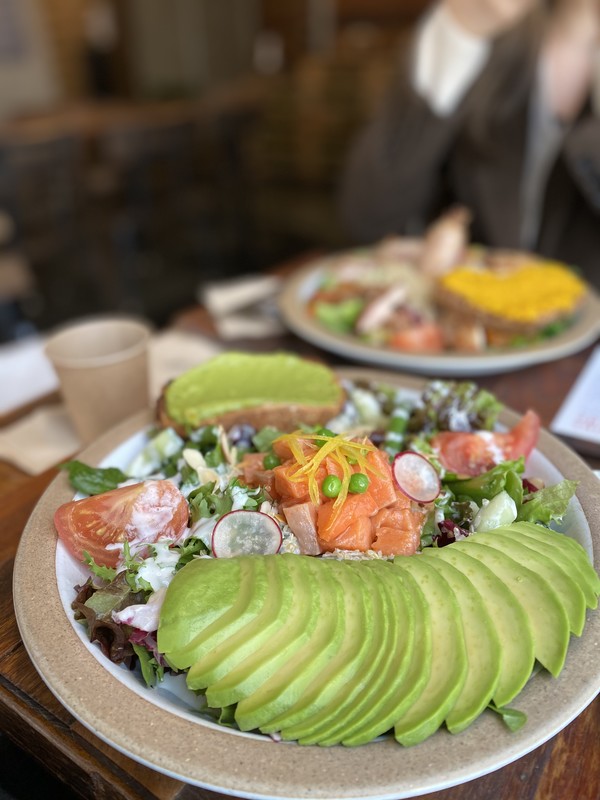
La FERME
La FERME is a superfood[7] restaurant located near Exit 3 of Line 6 Hangangjin station. It has a wooden garden-like interior, with green plants and colorful fruit décor that adds to its lively and natural atmosphere.
La FERME first opened in 2015, with its slogan “Super food, super day, super life, super you.” The restaurant incorporates superfood ingredients—avocado, salmon, sweet potato, whole grains, nuts, berries, leafy greens, etc—into their dishes to promote a healthy and energetic lifestyle. They locally source their chicken to minimize their impact on the environment. Other than their superfood menu, they also have a sugar-free “tea-tox” line, consisting of three types of tea: “detox,” “beauty,” and “skinny.” These teas help cleanse the body, brighten the skin, and burn fat. In addition to this, they also have a collection of detox cleansing smoothies called “super things” made of superfood. These colorful smoothies, excluding any sugar, water, and dairy, are claimed to help us recharge and gain a super lifestyle.
We tried their famous dishes: Avocado Salad and Chicken Quinoa Salad. Although La FERME does not provide entirely vegan menus, their incorporation of healthy greens, fish, chicken, and grains makes their dishes satiating and delicious. Their brand believes that by eating healthy superfood frequently, we can brighten and energize our lifestyles. Your experience in La FERME will allow you to realize the impact food has on our bodies and wellbeing.
Menu: Avocado Salad \15,800, Chicken Quinoa Salad \16,800
Hours: Mondays–Sundays, 11:30 a.m.-20:30 p.m., break time: 15:00 p.m.–16:00 p.m.
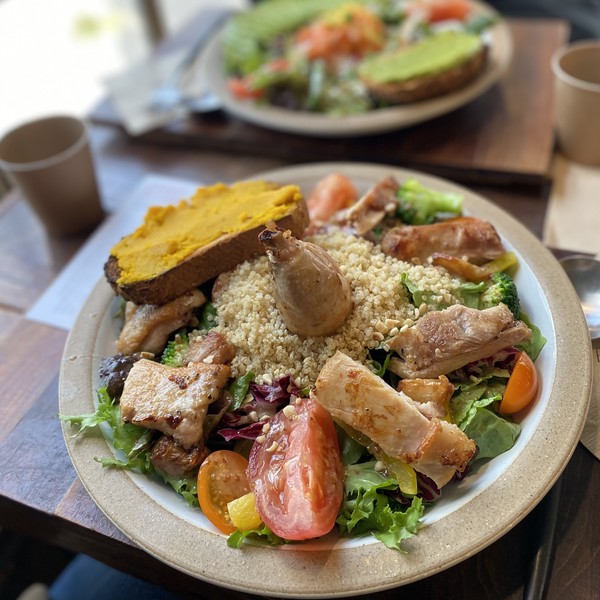
* * *
Despite their different backgrounds and approaches, all three restaurants allow customers to reconnect with culture and promote healthy and sustainable ways of living. With society posing more threats to our environment, it is becoming inevitable for us to reimagine the direction of food, for both the Earth and for our wellbeing.
[1] People for the Ethical Treatment of Animals (PETA)
[2] The Vegetarian Society of the United Kingdom Limited (VegSoc)
[3] muk-eun-ji: Korean word for fermented kimchi
[4] Whole Foods
[5] Halal food: “permissible” food, especially meat, that undergoes a specific preparation under Islamic law
[6] Shakshuka: A Middle Eastern vegetarian tomato stew dish
[7] Superfood: A label for foods rich in nutrients that can have a positive impact on our health

